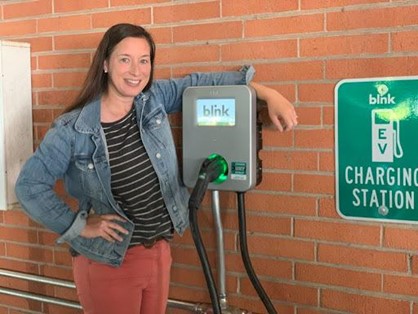The Teacher Behind Our New EV Curriculum

Nicole, our Ignited Teacher Fellow, developed an “EV Toolkit” for us this summer as part of a grant from Electrify America! During the school year, Nicole is a full-time high school Physics/Chemistry teacher in Concord, CA. We interviewed Nicole about her background and her project with us:
Tell us about your teaching journey.
I am beginning my fourth year teaching high school at Carondelet High School in Concord. At Carondelet, I teach Conceptual Physics to our incoming science students. In this course, students are able to use relatable phenomena, like a car’s acceleration or the pitch of a musical instrument, to explore the foundations of physics.
Prior to teaching here, I taught middle school math and science for 15 years in the South Bay. In this role, I loved finding the connections between math and science skills that we were working on. The math skills made more sense when put in context of the science content that we were exploring. Whenever possible, I like to continue to create these opportunities in science class so that students can draw these critical connections.
In our constantly changing world, how do you cultivate skills such as critical thinking and problem-solving in your classroom that will hold value in the future?
As a teacher, I hope to help students become independent learners who can thrive outside of the walls of the classroom. Fostering critical thinking and problem-solving skills are an essential piece to this puzzle. In order to promote these skills in the classroom, I ask open-ended questions that allow for deep thinking, multiple solutions, and evidence-based justifications. I love using inquiry-based labs whenever possible to encourage students to ask questions, investigate and seek answers independently. I try to always provide real-world context, allowing students to connect classroom learning to scenarios in their own lives. Finally, it is important to give time and space for reflection and other metacognitive strategies. When students are prompted to evaluate their own thinking, identify areas of improvement, and consider alternative perspectives, they can take ownership of their own growth and be self-motivated to go deeper and learn more.
Let’s talk about this summer’s project. You’ve been working on an EV Toolkit, what can you tell us about it?
The Transportation EVolved Toolkit is intended to be a repository of educational resources related to electric vehicles. A section of the toolkit consists of completed plug-and-play lessons with developed student handouts. These lessons incorporate scaffolded content using multiple modalities.
The toolkit also has a section with games, activities, and additional information on electric vehicles that teachers can incorporate into their lessons as they see fit. The final section of the toolkit shares programs and workshops that teachers can participate in if they’d like to become more involved in the sphere of electric vehicles, for example the EV Expo events held by Acterra. All resources in the toolkit are free to access by all educators.
The curriculum you’ve been developing can be found in this toolkit. What can you tell us about the lessons there?
These electric vehicle lessons are intended to be accessible to a wide audience. The goal is to find topics that would be relevant in middle school and high school in a range of courses from Earth Science to Physical Science to Algebra.
For example, in the lesson, “All Charged Up,” students build a penny battery to learn how a penny works and then scale that up to batteries inside an electric vehicle. In another lesson, “Vroom vs Zoom,” students complete a cost comparison of buying an electric car compared with a gas-powered car and then design a car buying tool for their peers. In “Mini Grand Prix,” students build their own cars using RAFT kits, trace the energy transformation from potential to kinetic energy, and iterate it to optimize performance on race day.
Whether a teacher is looking for an application for their energy unit or a hook for their human impact unit, the hope is that these lessons can plug into already existing middle/high school science units.
How do you plan to incorporate hands-on activities or experiments into the curriculum?
Through the Electrify America grant, Ignited is partnering with RAFT (Resource Area for Teaching) to develop classroom supply kits that are incorporated into some of the electric vehicle lessons. For example, as mentioned above, the “Mini Grand Prix” lesson has students building their own cars using a range of materials from CDs to wooden skewers to rubber bands. These car kits will be available for free for teachers to request from RAFT. [Available starting in September, keep a look out for this in our next newsletter!] In addition to the RAFT kits that are available for three of the lessons, there are other suggested activities that incorporate basic classroom supplies as well as interactive digital tools that only require access to the internet.